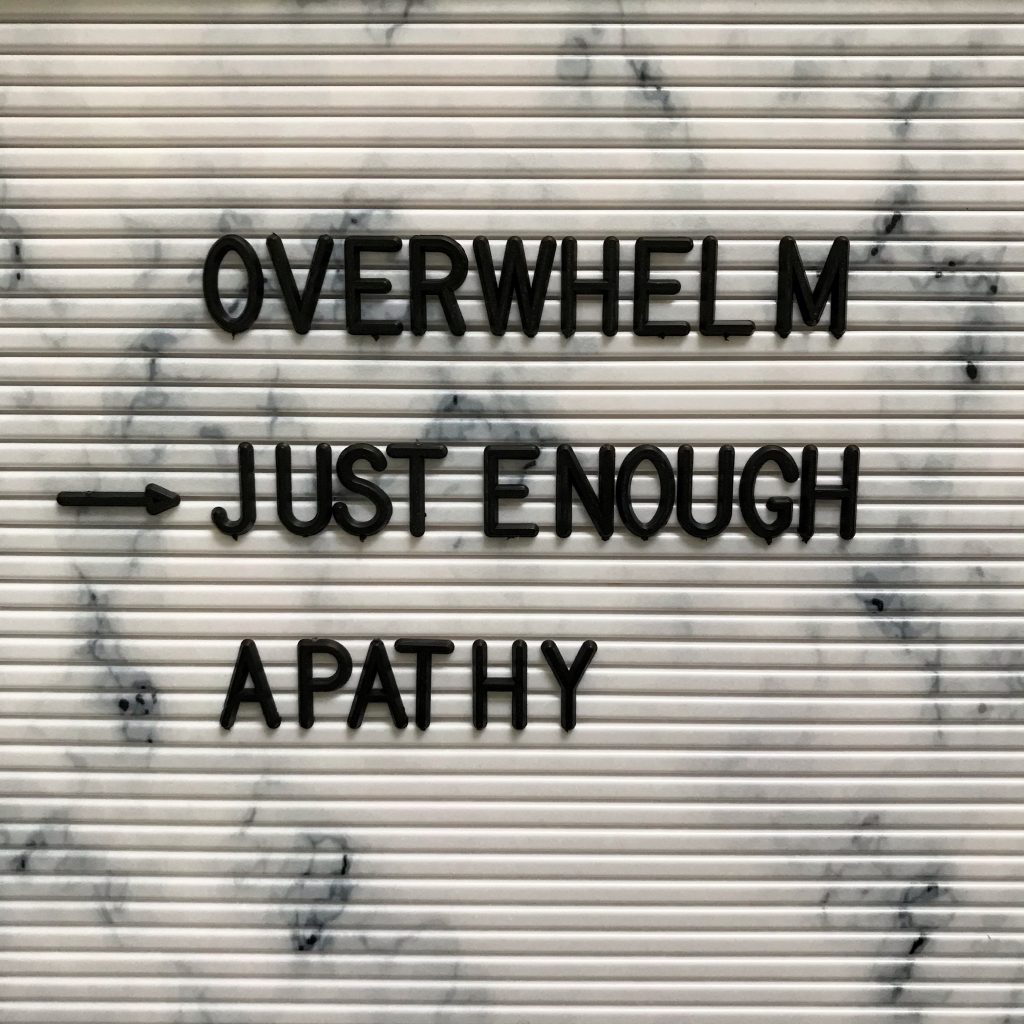I’m a crier. Doesn’t matter the emotion-when enough of it builds up, I cry. Happy, sad, angry, overwhelmed, excited… waterworks. Sometimes this is endearing, and sometimes is it supremely frustrating. I have told more than one person on more than one occasion, “Let me get my emotions out, and then I can handle the problem.”
I come by it honestly. My Dad has been known to get choked up while praying before the offering at church. One of his first dates with my mom was to a movie called “Where the Red Fern Grows.” She was trying not to cry when she glanced over and saw huge tears rolling down his cheeks.
We are criers and that’s okay. God made us to live a life filled to the brim with a full range of emotions.
Emotions color our lives, but when they get out of whack, we FEEL out of whack. Emotions too big or too strong can overwhelm us. On the opposite end of the spectrum, apathy paralyzes us. Overwhelmed or apathetic — inaction is not the life or heart of a Christ-follower. Emotions, like all things, need balance.
Everything
There are days that I feel like there is just too much bad in the world. The headline, case, or diagnosis are just too much, too hard, and too evil. Even tears seem inadequate to grieve.
The full range of human emotions is present in the book of Psalm. This week I was reading through Psalm 119 and came to verse 28: “My soul melts from heaviness: Strengthen me according to Your word.” That’s me- emotions so heavy that my heart drips as wax to a flame.
Where does the writer point? To God’s word. But I note that the passage doesn’t ask for rescue, but for strength. Strength doesn’t come to you only when you need it. You can’t take a pill to be strong. Strength comes from repeated use of a muscle over time.
To be strengthened by God’s word we must be in God’s word repeatedly over time. It isn’t a magic pill to take in trouble. It is the preparing of our minds and hearts to face what this world will bring.

I melt. He strengthens. But He does it through my consistent “exercise” in reading God’s word.
The Nothing
Did you ever watch “The Neverending Story?” It originally came out a few years before I was born, but like any classic, it is seared into the fabric of my childhood. Much like my father watching “Where the Red Fern Grows,” I bawled during a certain scene involving a horse and swamp. The villain in the film is not an evil genius or hideous monster. It’s nothing. More specifically, it’s The Nothing.
When asked what The Nothing is, one character replies, “It’s the emptiness that’s left. It’s like a despair, destroying this world.”
That’s what I think apathy is: feeling nothing, left only with empty despair.
A few weeks ago, I asked “What is the opposite of Anger?” on my social media and my friends were quick to answer. One of the answers that troubled me was apathy. I don’t want to feel and act in anger, but the right response isn’t to feel and to do nothing. Apathy isn’t just the absence of anger, it’s the absence of all emotion.

God made us to care and to feel. Anger is the correct response to injustice. Joy comes from my child’s hug or laugh. Grief, hope, love, excitement, humor, and concern are all normal and appropriate. Their absence is a bleak condition. Appropriate emotions are just that — appropriate. Controlling them doesn’t mean getting rid of them.
Jesus Felt.
Jesus Christ was fully God and fully man. Being a man, he felt human emotion. Being God, he experienced emotion as it was meant to be, never crossing over to pride, despair, or simply put, sin.
We read on numerous occasions that Jesus felt compassion. Most people cheer to recount Jesus’s righteous display of outrage at the moneychanger and sellers in the temple (Side note: we should probably view ourselves not as table-flipping by his side but humbly asking what tables we have set up that need to be flipped.)
. . . . .
Perhaps we see the most powerful picture of Christ’s emotions in two simple words: “Jesus wept.” (John 11:35) Here we find Christ at the tomb of his friend Lazarus and by the side of Lazarus’s sister Mary who is weeping (John 11:33).
But the two weeps are not the same. Put another way; Mary’s weeping is not the same as Jesus’s weeping. Although the two verses translate into the same English word in most Bibles, the original Greek are two separate verbs.
Mary’s weep is the Greek klaíō which means “properly, weep aloud, expressing uncontainable, audible grief” (Strong’s 2799). It is a sorrowful term associated with public mourning. When it is used in scripture it is often in the context of “weeping and wailing” or “weeping bitterly.”
However, when we read “Jesus wept,” the word used is dakruó which means “properly, to shed quiet (actual) tears; to weep silently (with tears)” (Strong’s 1145). Jesus felt, but his feeling didn’t control him. Why? Because he was in control.

Look back and remember that Jesus purposefully delayed so that Lazarus would be more than dead when he arrived. Not out of mean spirit or apathy, but to give God all the glory for the miracle that happened. Yet he didn’t say “Oh stop crying! I’m about to fix it!” He cared about their pain and he cares about ours. But the pain didn’t overshadow the plan.
How Much Should I Care?
Emotions are good. We should care. Somewhere between overwhelm and apathy is just enough. You know you are there by your actions. Both overwhelm and apathy lead to inaction. Caring too much paralyzes. Caring too little detaches. Both good and bad emotion naturally demands a response.
Consistent “exercise” in God’s word prepares us for that response.
Faith in His plan allows us to follow through.
Truthfully Yours,
DB
For a resource on talking to children about their feelings: Learn More about Tell God How You Feel